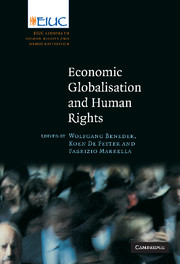Book contents
- Frontmatter
- Contents
- List of contributors
- Series editors' preface
- Preface
- List of abbreviations
- Introduction
- PART I Inter-disciplinary Perspectives on Human Rights and Economic Globalisation
- Economic Globalisation, Globalist Stories of the State, and Human Rights
- Towards a Theory of Global Ethics in Support of Human Rights
- Localising Human Rights
- Globalisation and Social Rights
- PART II The Relevance of Human Rights for International Economic Organisations
- PART III International Corporate Accountability
- Index
Globalisation and Social Rights
Published online by Cambridge University Press: 09 July 2009
- Frontmatter
- Contents
- List of contributors
- Series editors' preface
- Preface
- List of abbreviations
- Introduction
- PART I Inter-disciplinary Perspectives on Human Rights and Economic Globalisation
- Economic Globalisation, Globalist Stories of the State, and Human Rights
- Towards a Theory of Global Ethics in Support of Human Rights
- Localising Human Rights
- Globalisation and Social Rights
- PART II The Relevance of Human Rights for International Economic Organisations
- PART III International Corporate Accountability
- Index
Summary
Introduction: the social dimension of the global market
The growing economic interdependence between Nation-States, and the fast expansion of global trade, linked to international financial mobility, are at the origin of the extensive debate about the measures needed to protect fundamental social rights from the increased competition of markets and resulting competitive devaluation of national social policies. The latest analyses of the evolving tendencies of globalisation highlight two fundamental implications for national labour law systems. One is linked to the relationship between the economy and the State, and concerns the decline of the nation-state's control of the regulation of the market. The other relates to the de-nationalisation of economic activities by companies, especially multinational ones, in large part influenced by regional differences in labour costs and social security programmes, which transplants the declining of the regulatory capacity of the nation-state and ‘deconstruction’ into labour law systems.
Both tendencies risk causing a general rush towards an acceptance of a lowest common denominator level in workplace standards; standards which are anyway being threatened by what institutional economists call ‘destructive competition’ and by the resulting processes of global delocalisation of production, phenomena which are followed by the competitive devaluation of internal social policies. The search for greater competitiveness is often carried out, even in the more advanced and consolidated economic systems, through the compromise of social rights and sweatshop-like practices instead of through re-planning of organisational models of production based on making workers responsible and involving them.
- Type
- Chapter
- Information
- Economic Globalisation and Human RightsEIUC Studies on Human Rights and Democratization, pp. 93 - 134Publisher: Cambridge University PressPrint publication year: 2007
- 1
- Cited by

